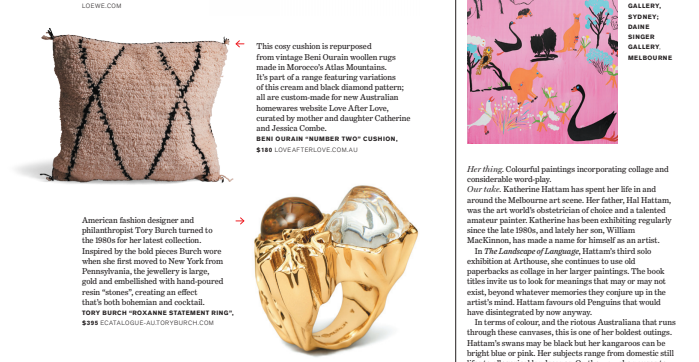
Chapter Two
The Five Life Lessons I've Learnt from Nigella Lawson
Jessie Combe

I am a devout and unashamed Nigella Lawson fan, a job I take very seriously. Though to continue that metaphor, were Nigella my boss, my resume would suggest that I have not been up for the task with previous employers. Fledgling stints with different companies, failing to show up, not staying abreast of correspondence and even an uncharacteristically shy bent when it comes to meetings with the boss. This and more, my references would reveal. Indeed, I have never had an interest in or been very good at “being a fan”. But when it comes to Nigella, I have never called in sick.
I’m used to the typical responses from new friends upon hearing the news. From most mates, it’s an eye-rolling, “everyone is obsessed with Nigella.”. From most girlfriends, it’s a hand-on-heart, “everyone is obsessed with Nigella.”. She has a universal, even equally gendered appeal, it is true, and so whatever the reason, I befriend all colleagues. Yet my passion for Nigella has less to do with her food, or even her mellifluence (though both are wonderful) and more to do with the lessons I have learnt from reading between the lines, that have endeared her to me so.
These are the five life lessons I have learnt from Nigella Lawson:
When we connect truly and deeply with one another, the superfluous cannot be anything else but simply that which it is, superfluous.
There’s something so very marvellous about the way she slops some store-bought hummus into a bowl, plonks it on the table between an enormous, melting wedge of brie and some guacamole and corn chips and calls it a meal. As though we are the stupid ones for not realising that connection, true and eye-meeting, has a lustre that even the most seamlessly prepared, authentically themed dinner cannot outshine.
However, when one finds oneself in need of comfort, it is the knowledge that in beauty it may be found that truly soothes the soul.
She is indulgent in every sense of the word. Of her qualifications, she jokes that greed is her only one. Many are more familiar with Nigella Lawson in a bathrobe than they are with their own husband or wife in the same ensemble. Her television programs are oft punctuated by soft-lensed, pantry interludes where she jangles her gaudy string of red-chilli fairy lights, informing the audience of her proclivity for spice. Or better still, she is nestled amongst a room full of books, consulting cooks and writers who’ve come before her, for inspiration. Lawson is an original arbiter of excess. But only in so far as she, and we the audience or reader, understand that it is a confidence in what we choose to create and how we contextualise our lives that may prove to be the salve for moments more untethered or unsure.

We can find time, patience and love for other people when we live freely and in union with who we are when we are alone.
In Lawson's first book, How to Eat, rather more memoir than cookbook, Lawson has a chapter, “One & Two”, on cooking for yourself or just one other person. On eating alone, she writes, “I like, [too], the smaller special project, the sort of indulgent eating that has something almost ceremonial about it when done alone. I’m not saying I don’t often end up with the au pair special, a bowl of cereal…but I believe in the rule of ‘Tonight Lucullus is dining with Lucullus.’” (Lawson, 1998, p127)
For those who aren’t familiar with the story of the Ancient Roman general, it is enough to know that however we choose to do it, spending time with ourselves is fundamental for developing our expectations of and behaviour around others. Indeed, she concludes her introduction by suggesting that cooking for yourself encourages experimentation, a playfulness and a trust in your own instincts that can be missed when looking to “razzle-dazzle” and so robotically following a recipe to avoid catastrophe. Cooking for yourself, and by extension, caring for yourself, is “how you’re going to find your own voice.”.
One should be open-minded in one’s interests and friendships, yet wise enough to continue to cultivate and tend to one’s true passions and people.
On this topic, we shall consult Lawson’s musings on the at-home herb garden, of course.
“You should grow your own herbs if you can and want to, but don’t spread yourself, or your plants, too thinly. It is counter-productive if you have so little of each herb that you never pick much of it for fear of totally denuding your stock…As with so much to do with food, a lot of a little rather than a little of a lot is the best, most comforting and most useful rule.” (Lawson, 1998, p11)
I have always had a little of a lot by way of close friendships rather than a lot of a little. Yet when it does come to cultivating new friendships, I admit I can take a somewhat all or nothing approach. If you’re like me, rather than burrowing down into comfortable old friendships and ducking for cover when a new one comes along, perhaps it’s time to allow them to send you skyward in pursuit of new interests. Old friendships can give you the strength you need to pursue new ones without risk of losing it all. New friendships can be vital to encourage curiosity and might even help to re-contextualise our appreciation for the people and the passions that hold up our hearts. A little bit of this, a little bit of that, no denuded stock but a fully-garbed crop to get you through the winter.
Don’t let another’s fear become yours. Be confident in the knowledge and the skills that are uniquely your own. Know when to heed advice and when to stand your ground.
Nigella Lawson once had a particularly frightful experience with Mayonnaise. For which she has an almost religious adoration when served as a partner to her beloved cold roast chicken. Her feelings towards the making of mayonnaise, she connects with an adolescent enthusiasm for Henry James, whom she read “with uncorrupted pleasure.". Lawson (1998, p12) writes, “…when I was eighteen or so, and had just started ’The Golden Bowl’, someone - older, cleverer, whose opinions were offered gravely - asked me whether I didn’t find James very difficult, as she always did. Until then, I had no idea that I might, and didn’t. From that moment, I couldn’t read him but self-consciously; from then on, I did find him difficult…I had a similar, Jamesian mayonnaise experience…”.
In starting this business, there have been moments where I have let the opinions or honest questions of others, paralyse me with fear, or reframe my perspective to its detriment. Yet Love after love would also not exist without the knowledge, the scootch, the mad ramblings, the odes and the stories, that are uniquely, distinctly, ours. All of ours.
It won’t surprise you then, that I think we could all afford to inject a little more Lawson-ology into our lives. That I believe wholeheartedly in the power of beauty, food, love and words to sustain us through life’s greatest challenges. Challenges we face together and challenges we face on our own. In fact, I do suspect that when we connect the heart with the mind and stop following the recipe, ceremoniously or otherwise, we reveal to ourselves the possibility that this is all one shared experience. In my loneliest moments I have found friends whose voices have reached through the pages of books, across dinner tables and become entangled in the poetic beauty of the everyday and in my most buoyant, generative or creative moments, I have been brought to a halt by small moments of beauty, become rejuvenated through love and been recontextualised and grounded by the words and lessons of others. Nigella or not.
xx Jessie

#shareyourstory in the comments below or @_loveafterlove_
References:
Lawson, Nigella 1998, How to Eat. Chatto & Windus, London.



1 comment
Beautiful writing. Nigella needs to read this.
Adam
Leave a comment
This site is protected by hCaptcha and the hCaptcha Privacy Policy and Terms of Service apply.